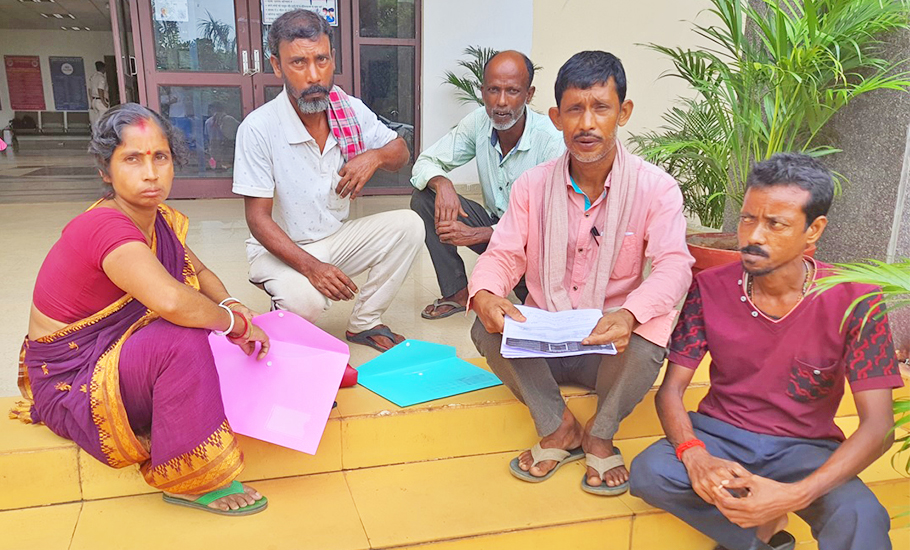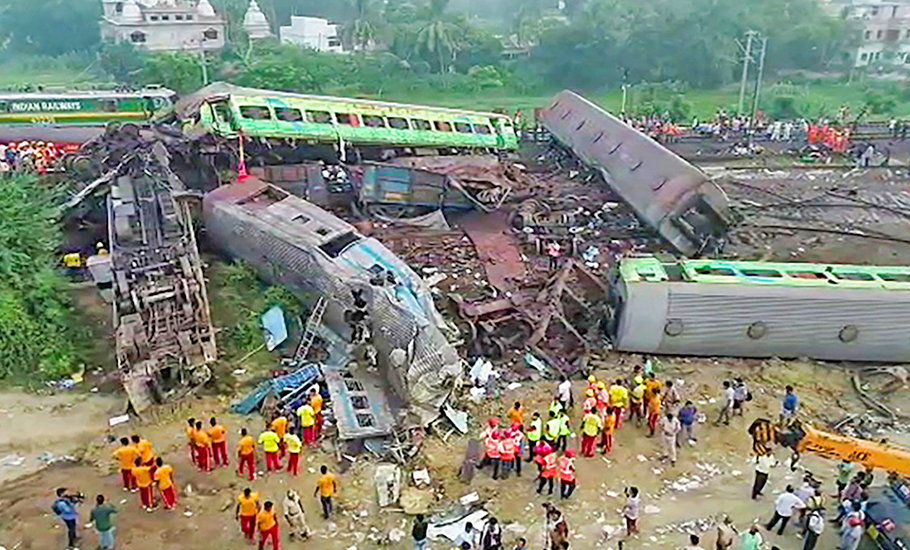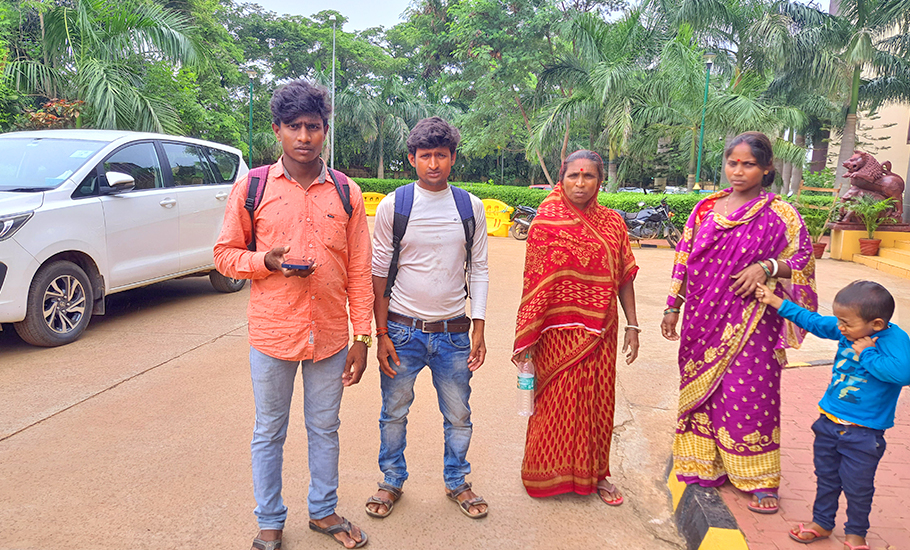
- Home
- News
- Analysis
- States
- Perspective
- Videos
- Education
- Entertainment
- Elections
- World Cup 2023
- Features
- Health
- Business
- Series
- Economy Series
- Earth Day
- Kashmir’s Frozen Turbulence
- India@75
- The legend of Ramjanmabhoomi
- Liberalisation@30
- How to tame a dragon
- Celebrating biodiversity
- Farm Matters
- 50 days of solitude
- Bringing Migrants Home
- Budget 2020
- Jharkhand Votes
- The Federal Investigates
- The Federal Impact
- Vanishing Sand
- Gandhi @ 150
- Andhra Today
- Field report
- Operation Gulmarg
- Pandemic @1 Mn in India
- The Federal Year-End
- The Zero Year
- Premium
- Science
- Brand studio
- Home
- NewsNews
- Analysis
- StatesStates
- PerspectivePerspective
- VideosVideos
- Entertainment
- ElectionsElections
- Sports
- Loading...
Sports - Features
- BusinessBusiness
- Premium
- Loading...
Premium

The missing Odisha train accident victims and the agonising wait for families

On June 2, 22-year-old Bipul was on his way home with butterflies in his stomach and a voice brimming with excitement, which his family had sensed, when they last spoke to him before he boarded the general coach of the Yesvantpur-Howrah Express. The excitement was natural. Bipul, who worked as a mason in Tirupati, was on board the Yesvantpur-Howrah Superfast Express, heading home at Bhangi...
On June 2, 22-year-old Bipul was on his way home with butterflies in his stomach and a voice brimming with excitement, which his family had sensed, when they last spoke to him before he boarded the general coach of the Yesvantpur-Howrah Express.
The excitement was natural. Bipul, who worked as a mason in Tirupati, was on board the Yesvantpur-Howrah Superfast Express, heading home at Bhangi Dwitia Khanda village in the Cooch Behar district of West Bengal for his wedding. Bipul’s journey was however cut short. He lost his life in the tragic train accident involving three trains at Bahanaga Bazar station under Odisha’s Balasore district. If the death was tragic, the fate of Bipul’s body over nearly the next two months was heart-wrenching.
The accident, unarguably the worst on rail tracks in the last three decades, claimed 288 lives on the spot and left nearly 1,000 others injured, some so grievously that they lost limbs.
Also Read | Who helped the Odisha train victims after PM Modi and Minister Vaishnaw left Balasore
In the days that followed, five others succumbed to their injuries at Cuttack’s SCB Medical College and Hospital (SCBMCH) while two more injured died in hospitals outside of Odisha. However, 81 bodies, including that of Bipul, couldn’t be identified with certainty and were preserved at AIIMS Bhubaneswar.
Identifying the dead
On one hand, some bodies were mutilated in the accident itself. On the other, given that it was peak summer when the accident happened, the heat augmented the rotting process, making it impossible to identify the persons even for family members. In some cases, multiple families laid claim to the same body. When the Indian Railways found it impossible to identify the bodies with the photographs the families of the victims were carrying, a decision was made by the organisation and the Odisha government to go for DNA profiling. Samples drawn from 84 persons were sent to the Central Forensic Science Laboratory (CFSL), New Delhi.
As results of the DNA profiling started trickling in, 46 bodies were handed over to their respective families, a senior East Coast Railway officer told The Federal.

“Thirty-five bodies are still at the AIIMS. These have been kept in refrigerated containers and will be kept there till a final decision is taken at the appropriate level,” the railway officer said.
Incidentally, a day after the accident, Bipul’s uncle Bharat had identified ‘Body No. 14’ as that of his nephew from the tattoo on his arm. But Bharat decided to wait for Bipul’s father and his younger brother Siba Kanta Ray, who arrived late in the night, to make the final call.
On June 4, Siba and Bharat headed to the private medical college in Bhubaneswar where all the bodies had been moved for relatives to identify. To their shock, the duo learnt that Body No. 14 had already been claimed by a family from Bihar. Cursing their luck, Siba and Bharat also made a claim to the body and decided to stay on in Bhubaneswar till they were handed over Bipul’s body.
“Siba and his brother visited us every day and stayed here for long hours. They pleaded for help for their son’s body. We could feel their pain,” an official at AIIMS said, adding, “DNA samples were collected from Siba twice.”
After staying in a guest house in Bhubaneswar, which was just about a kilometre away from AIIMS, for over a month, Siba and Bharat headed back to their village around July 7. The Indian Railways had made provisions for the stay and food for the families of the victims at the guest house, still staying away from home was tough for the duo.
“We had come in search of Bipul with just one pair of clothes, which we wore all through our stay in Bhubaneswar. Also, we were away from our families for such a long time. So we thought of going home for a few days,” Bharat told The Federal.
The never-ending ordeal
About a week later, on July 14, Siba received a call from AIIMS informing him that Bipul’s body has been identified through the DNA test.
Ironically, the grief over Bipul’s death made way for some relief when the news of the body being identified came in.
“We had lost all hope, so initially we couldn’t believe what we heard. But when we got another call, we were sure our ordeal was over. Siba hugged me, we both cried like kids,” Bharat recalled.
Without wasting any time, Bharat, Siba and his wife Laxmi, and two other close relatives set out for AIIMS along with the required documents as well as bank passbooks.
At AIIMS, Siba went into a room to complete the formalities. When he emerged from the room, he got into an animated discussion with his family. “Ek aur samasya aa gaya (another problem has cropped up),” he told those gathered around.
The Indian Railways and the hospital authorities had agreed to hand over the body to the family and also provide two vehicles to the family — one for the body and the other for the family members. But the authorities were advising against making the journey from Bhubaneswar to Cooch Behar, a distance of over 1,000 km.
“Bipul’s body has badly decomposed and may not sustain even for an hour after it’s brought out of the container. Plus, it will be extremely difficult to bear the foul smell emanating from the body. The decision is ours, we must decide quickly,” Siba announced to his family. It was already noon by then.
Siba, Bharat and another relative, Pulin Burman, then broke away from the group to make hurried phone calls to relatives back home and seek their advice, even as the others stood in and began discussing what to do among themselves.
After about 10-15 minutes of phone calls and in-person chatter, Siba and Bharat heaved a sigh of relief as a decision had been made. The family decided to cremate Bipul’s body in Bhubaneswar itself.
Siba stepped back inside the office room and informed the authorities about the decision. By 4 pm, Bipul’s body had been consigned to flames. When the cremation was done, Siba began collecting pieces of bones from the ashes. He placed the bones in a piece of cloth, wrapped it and tucked it in his bag.
Laxmi saw her husband collect the remains of her son through teary eyes.
The family knew they had no time to grieve. They consoled each other, wiped their faces as the overcast monsoon sky started turning darker. They collected their baggage and rushed to the railway station to catch the next available train to Kolkata. They immersed Bipul’s bones in the Ganges at Kolkata before reaching home knowing their son Bipul would never return home.
“It’s all god’s wish,” Siba said.
Yet to come to terms with the loss and the agonising wait for the body to be identified, Siba doesn’t forget to convey his gratitude to the railways, AIIMS authorities, media and all others who helped him get his son’s body and perform the last rites. “I am going through the worst phase of my life. I pray God doesn’t subject anyone else to what I have gone through,” he said wiping his tears.
But getting the bodies of the victims doesn’t end the ordeals of families. There are many battles being fought alongside.
Fighting for compensation and the ongoing search for those missing
Thirty-year-old Ashok Ravidas of Pipal Tala (Harishchandrapur) under Malda district of West Bengal is carefully screening the documents he has brought with him. Giving him company is his mother Yasoda, who is 59 years old, while his sister has gone out for water.

Ashok had carried home the body of his younger brother Krishna, 23, mid-July. Krishna, who worked as a construction labourer in Bengaluru was returning home in one of the trains involved in the accident.
While Ashok received the compensation cheque, the family couldn’t encash it due to some technical issues. “We are here to collect the death certificate of my brother, which we will produce in the bank,” Ashok told The Federal.
A few metres away, 67-year-old Ghanashyam Malik from a village in Balasore district sits on the floor, visibly tired.
Despite his failing health, Ghanashyam has been doing the rounds of AIIMS since June 4. Luck has, however, so far eluded him. Over 50 days since the accident, the sexagenarian has not received any information about his 35-year-old son-in-law Kartik Behera, who was travelling from Bengaluru in the Yesvantpur-Howrah Superfast Express.
Ghanashyam visits AIIMS, almost regularly with his wife and daughter (Kartik’s wife), who carries her one-year-old baby girl on her shoulder.
“Bahanaga accident has shattered us completely. No one gives me any information about Kartik’s body. Even the DNA report is taking a lot of time to arrive. Now, I am very scared and anxious over what lies ahead,” Ghanashyam speaks in whispers as his voice cracks.
“I don’t know how my daughter will live and what will be the future of my granddaughter after my death,” he cries.
Seeing Ghanashyam’s condition, his daughter, who refuses to tell her name or talk to anyone, pats on her father’s shoulders. She pleads her father to not cry.
“Please don’t ask us anything,” she says with folded hands, “God has been very unkind to us, perhaps we are repaying for some of our actions in the past life.”
Ghanashyam takes a sip of water. He is aware of the endless wait staring at his family. He is not bothered about their return journey, though.

